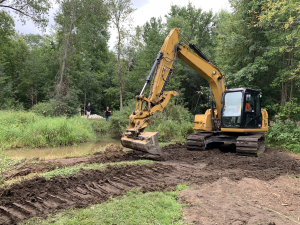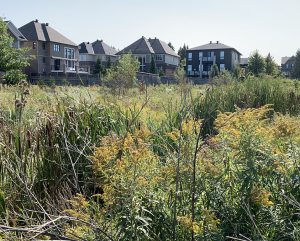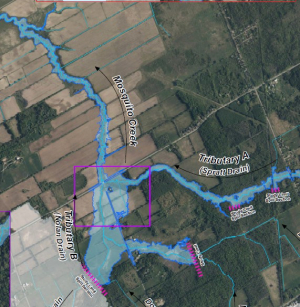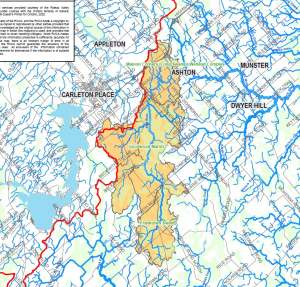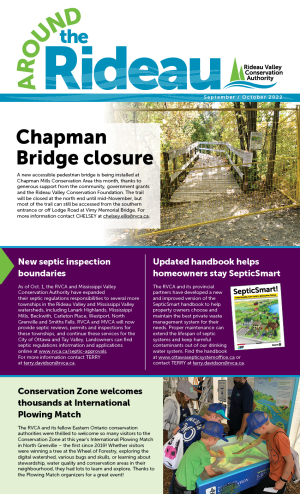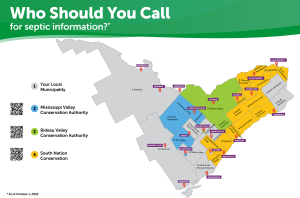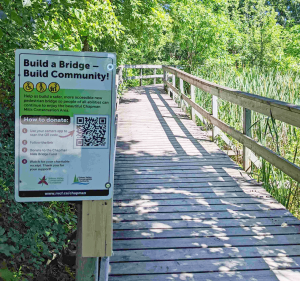Super User
Bill 23: Less Protection, More Cost, Diminished Local Decision-Making
Taxpayers, municipalities and our natural systems will bear the costs of the Province’s affordable housing legislation released last month.
Email your MPP using our Sample Letter (Word Document)
While the Rideau Valley Conservation Authority strongly supports efforts to address the ongoing housing crisis, many of the proposed changes related to conservation authorities will have significant impacts and costs while doing little to increase housing supply.
Proposed changes and their impacts:

- Weakening the regulatory ability of CAs to protect people and property from natural hazards like flooding, erosion and slope failures - leading to greater risk of property damage and public safety.
- Eliminating the CA’s ability to address water quality issues through planning and permitting, leading to increased nutrients and sediment in lakes and rivers. We know from the 1990s this causes excessive weed growth and algae blooms that have economic impacts on property values, agriculture, tourism, recreation, fisheries and sources of drinking water for many residents.
- Reducing wetland evaluations and protections, leading to increased flooding, erosion and drought, as well as diminished groundwater, which is the source of drinking water in much of rural Ontario. Studies have shown the loss of wetlands in the Rideau watershed would increase flood levels by 10%.
- Downloading more responsibilities to municipalities who have indicated will lead to inefficiencies, delays and increased risk and costs.
- Freezing development fees, which will pass development costs to taxpayers instead of growth paying for growth.
Take Action
To learn more or to provide input on the proposed changes, visit the Environmental Registry of Ontario for these Notices:
- URGENT: Closes Dec. 9, 2022: Legislative and regulatory proposals affecting conservation authorities to support the Housing Supply Action Plan 3.0 (ERO number 019-6141)
- Closes Dec. 30, 2022: Proposed updates to the regulation of development for the protection of people and property from natural hazards in Ontario (ERO number 019-2927)
- Closes Dec. 30, 2022: Proposed changes to natural heritage protections and regulations (ERO number 019-6161)
Or use our sample letter to email your MPP:
More Resources:
Eastern Ontario Mayors Support CA Concerns About Housing Bill 23
RIDEAU VALLEY, Nov. 17, 2022 – More than 30 Eastern Ontario mayors have endorsed a Conservation Authority letter to the province expressing concerns with provincial Bill 23, the More Homes Built Faster Act.
The letter, written by 10 Eastern Ontario CAs, was sent to Premier Doug Ford and relevant cabinet ministers earlier today.
“We are overwhelmed and incredibly grateful for the support we have received from local municipalities,” said Sommer Casgrain-Robertson, General Manager of the Rideau Valley Conservation Authority. “It was disheartening that this bill only had a 30-day consultation period given the magnitude of the proposed changes and that this short consultation period fell during the turnover of municipal councils.”
In their letter, the Eastern Ontario CAs outline six key concerns with the bill and how the changes will negatively impact local development review processes, download new responsibilities to municipalities, increase costs to taxpayers, increase the risk of flooding, erosion and slope failure and damage the local environment.
But the CAs also provide recommendations to the province of how to improve Bill 23 and call for meaningful consultation with CAs, municipalities, and the development and agricultural sectors to identify real solutions that will increase housing without having unintended and irreversible consequences.
It is well understood that water flows across municipal boundaries – and so do the impacts of development. That’s why over the past 70 years, municipalities have formed 36 CAs across Ontario to assess and understand the cumulative impact of development within each watershed. At a time when climate change is causing more frequent and intense storm events, the role of CAs has never been more critical.
Learn more:
- Eastern Ontario Conservation Authority Joint Letter to Premier Ford, Minister Clark, Minister Smith and Minister Piccini (PDF)
- RVCA Responds to Province’s More Homes Built Faster Act
Provide input on the proposed changes through the Environmental Registry of Ontario:
- Proposed updates to the regulation of development for the protection of people and property from natural hazards in Ontario (ERO number 019-2927)
- Legislative and regulatory proposals affecting conservation authorities to support the Housing Supply Action Plan 3.0 (ERO number 019-6141)
Consider sending our sample letter to your local MPP:
-30-
Bill 23: Less Protection, More Cost, Diminished Local Decision-Making
RVCA Responds to Province’s More Homes Built Faster Act
RIDEAU VALLEY, Nov. 10, 2022 – Taxpayers, municipalities and our natural systems will bear the costs of the Province’s affordable housing legislation released last month.
While the Rideau Valley Conservation Authority strongly supports efforts to address the ongoing housing crisis, many of the proposed changes related to conservation authorities will have significant impacts and costs while doing little to increase housing supply.
“Improvements to the system must never be at the expense of protecting people and their properties from flooding, erosion and slope failures, or protecting the very features that reduce these risks such as wetlands,” said Sommer Casgrain-Robertson, General Manager of the Rideau Valley Conservation Authority.
Proposed changes and their impacts:
- Weakening the regulatory ability of CAs to protect people and property from natural hazards like flooding, erosion and slope failures - leading to greater risk of property damage and public safety.
- Eliminating the CA’s ability to address water quality issues through planning and permitting, leading to increased nutrients and sediment in lakes and rivers. We know from the 1990s this causes excessive weed growth and algae blooms that have economic impacts on property values, agriculture, tourism, recreation, fisheries and sources of drinking water for many residents.
- Reducing wetland evaluations and protections, leading to increased flooding, erosion and drought, as well as diminished groundwater, which is the source of drinking water in much of rural Ontario. Studies have shown the loss of wetlands in the Rideau watershed would increase flood levels by 10%.
- Downloading more responsibilities to municipalities who have indicated will lead to inefficiencies, delays and increased risk and costs.
- Freezing development fees, which will pass development costs to taxpayers instead of growth paying for growth.
“We are calling on the Provincial Government to reconvene their multi-stakeholder Conservation Authorities Working Group to consider the impacts of these proposed changes,” said Casgrain-Robertson, who is a sitting member of the working group. “The working group has proven it can provide effective recommendations to government that increase housing supply without jeopardizing public safety, dismissing natural systems or downloading additional responsibilities to municipalities.”
The Ontario Association of Municipalities (AMO) shared similar concerns, stating “many of the proposed amendments to the Conservation Authorities Act and the Planning Act in Bill 23 are concerning, as they signal a move away from environmental protection at a time when climate change impacts are being felt more at the local level. Bill 23 proposes sweeping changes to the regulatory responsibilities of Ontario’s 36 conservation authorities that, if passed, will undermine the collaborative and productive changes put forward by the Ministry led Conservation Authority Working Group over the past two years”.
It is well understood that water flows across municipal boundaries – and so do the impacts of development. That’s why over the past 70 years, municipalities have formed 36 CAs across Ontario to assess and understand the cumulative impact of development within each watershed. At a time when climate change is causing more frequent and intense storm events, the role of CAs has never been more critical.
“CAs have proven they are not a barrier to development, but rather facilitate sound and reasonable growth,” said Pieter Leenhouts, Chair of the Rideau Valley Conservation Authority. “They have been modernizing their policies and procedures, streamlining approvals, reducing timelines, meeting and reporting on service standards and promoting pre-consultation with applicants to provide the best service possible to municipalities, communities, residents and developers.”
Not a barrier:
- The Province’s “Housing Affordability Task Force Report” introduced 55 recommendations to increase the housing supply in Ontario, and CAs were not named within the report.
- CAs save municipalities and developers time and money, as the cost-efficient CA system allows member municipalities to share the expertise of CA hydrogeologists, biologists and engineering staff to review planning applications instead of each hiring their own – a huge savings for taxpayers.
- CAs also save the Province and taxpayers money by reducing the financial impacts of severe flooding like Eastern Ontario experienced in 2017 and 2019. The province’s own Special Advisor on Flooding, Doug McNeil, in his 2019 report found that Ontario’s unique CA system remains the fundamental reason why Ontario has not seen the same catastrophic flooding impacts in the billions of dollars as Alberta and BC, which do not have CAs to direct development away from high-risk areas.
“CAs are recognized as a cost-efficient, collaborative partner,” said Casgrain-Robertson. “We are committed to helping Ontario meet its housing goals by ensuring safe and sustainable development that balances the needs of people and the environment, the economy, and local ecology.”
For more information about the RVCA and CA roles and responsibilities, visit www.rvca.ca.
To learn more, or to provide input on the proposed changes, visit the Environmental Registry of Ontario for these Notices:
- Proposed updates to the regulation of development for the protection of people and property from natural hazards in Ontario (ERO number 019-2927)
- Legislative and regulatory proposals affecting conservation authorities to support the Housing Supply Action Plan 3.0 (ERO number 019-6141)
ERO 019-2927 also includes a Consultation Guide on how to provide your input.
To read Bill 23, visit the Ontario Legislative Assembly at this web page at Bill 23, More Homes Built Faster Act, 2022
-30-
Hearing Procedures
If your application has been refused or approved with conditions, you can appeal through a the RVCA's Hearing Board.
For guidance, downoad the RVCA Hearing Procedures.
Upper Jock River Flood Risk Mapping Study from Richmond Road to Ashton Station Road, July 2021
ATR — September-October 2022
New StoryMap takes deep dive into region's vulnerable drinking water
EASTERN ONTARIO, Oct. 17, 2022 – The Mississippi-Rideau Source Protection Region (MRSPR) has released an interactive StoryMap exploring threats to our region’s highly vulnerable aquifers – and what we can do about them.
Readers of all backgrounds and interest levels can use the new StoryMap to explore risks to groundwater through its digital maps, charts and photos.
“Whether you’re interested in the geology behind our groundwater system, the impacts of contamination on your family or what you can do about it, our new StoryMap offers a choose-your-own-adventure to explore a huge range of information,” said Rideau Valley Conservation Authority groundwater scientist Claire Milloy, who wrote and designed the digital product on behalf of the MRSPR.
About 90% of drinking water aquifers across the Mississippi and Rideau watersheds are considered highly vulnerable to contamination. These aquifers have very little protection from surface soils, which are necessary to filter chemicals, nutrients and other pollutants out of surface runoff as it trickles down from above.
Cracks in the exposed bedrock can allow contaminants from industrial, agricultural and residential activities to easily enter the groundwater below - and they're sometimes impossible to clean up.
The StoryMap and its accompanying resources were developed in accordance with an MRSPR policy encouraging groundwater threat awareness.
The education package also includes a series of “action sheets” highlighting best practices for homes and businesses, a three-part animated video series developed by the Spring Ridge Training Institute, and an extensive scientific bibliography intended for scientists, researchers, planners and engineers.
“We sincerely hope these resources will help shed some much-needed light on the risks facing our local groundwater supplies,” said Milloy, P. Geo. “It only takes a few minutes to contaminate an aquifer, but it can take hundreds of years to undo the damage – if it can be undone at all.”
The 8,500 km2 MRSPR is one of 19 in Ontario created under the Clean Water Act of 2006, which now operate through local conservation authorities. The MRSPR encompasses the watersheds of the Mississippi and Rideau rivers, and is jointly administered by the Rideau Valley and Mississippi Valley conservation authorities as well as a multi-stakeholder Source Protection Committee.
To learn more about highly vulnerable aquifers visit www.mrsourcewater.ca.
-30-
Local Conservation Authorities expand septic approval services
MISSISSIPPI and RIDEAU VALLEY WATERSHEDS, October 5, 2022 – Landowners in several Eastern Ontario municipalities will now receive septic approval services from their local conservation authority.
As of October 1, 2022, the Mississippi Valley and Rideau Valley Conservation Authorities have begun providing septic inspections, reviews and permits on behalf of the following municipalities:
- Township of Beckwith
- Town of Carleton Place
- Township of Lanark Highlands
- Town of Mississippi Mills
- Township of North Grenville
- Town of Smiths Falls
- Town of Westport
These municipalities were formerly serviced by the Leeds, Grenville and Lanark District Health Unit.
The Mississippi Valley and Rideau Valley Conservation Authorities have been providing septic review and approval services in the City of Ottawa and Tay Valley Township for more than 25 years and have knowledgeable and experienced staff to support this increased service area.
“We are pleased to support our local municipalities with septic review and approval services required under the Ontario Building Code,” said Terry Davidson, RVCA Director of Regulations and Chief Building Official for program delivery across the two watersheds. “We look forward to working with contractors and residents to ensure systems are properly installed and repaired with the goal of protecting homeowners and keeping communities healthy and safe.”
The Leeds, Grenville and Lanark District Health Unit will carry out all inspection work for permits received or extended on or before September 30, 2022. Property owners who have previously submitted a septic permit prior to September 30, will continue to have their application overseen by the Health Unit.
Visit www.rvca.ca/septic-approvals for a map of Eastern Ontario to guide you to your local septic approval agent as well as forms, fees, frequently asked questions, and other sewage system resources for landowners and contractors.
-end-
For more information:
Terry Davidson, P. Eng.
Director of Regulations and Chief Building Official
613-692-3571 or 1-800-267-3504 ext. 1107
Part of Chapman Mills trail to close for bridge replacement
BARRHAVEN, Sept. 27, 2022 – A section of trail at Chapman Mills Conservation Area will close on Monday, Oct. 3 so crews can install a new, state-of-the-art accessible pedestrian bridge this fall.
The current wooden bridge near the northern trailhead of Barrhaven’s most beloved boardwalk has reached the end of its life cycle. Thanks to local donors, several significant grants and support from the Rideau Valley Conservation Foundation (RVCF), the Rideau Valley Conservation Authority has secured the funding to do the work.
The trail will be closed on either side of the bridge for about six weeks. Visitors can still access the docks and picnic shelter from Winding Way Ave. Most of the trail will remain accessible from the southern trail connection beside Vimy Memorial Bridge.
“This is a really exciting project that will improve accessibility and safety at one of our busiest properties,” said Chelsey Ellis, RVCA’s conservation lands manager. “We know the closure will be inconvenient in the short term, but it’ll be worth it.”
The current bridge has several accessibility issues: it’s not wide enough for two people with wheelchairs or strollers to pass, for example, leaving one person to back up beside the path’s steep shorelines. The narrow bridge also led to temporary park closures in the early days of the COVID-19 pandemic because adequate physical distancing couldn’t be maintained – leaving many local residents without their go-to nature escape just when they needed it most.
RVCA staff worked with the RVCF and local accessibility consultant Marnie Peters to ensure the new bridge is built to the gold standard of accessibility – not just the legislated minimums. This includes a wider deck, more gradual slopes, accessible sight lines and longer ramps.
“It’s critical that this urban oasis be as accessible as possible for the local community,” Ellis said. “It’s close to two large seniors’ residences and is located in the middle of a family-friendly suburb. It was time to get this done.”
Individuals can still donate to the bridge project directly at https://www.canadahelps.org/en/dn/73114.
To learn more visit www.rvcf.ca/ways-to-give/chapman-mills-accessible-bridge or contact Chelsey Ellis at .
-30-
